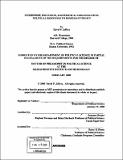Citizenship, exclusion, and political organizations : political response to immigrant policy
Author(s)
Jeffrey, David P., 1962-
DownloadFull printable version (20.21Mb)
Other Contributors
Massachusetts Institute of Technology. Dept. of Political Science.
Advisor
Suzanne Berger.
Terms of use
Metadata
Show full item recordAbstract
The dissertation examines whether policy can foster the political incorporation and democratic participation of immigrants. The study compares immigrants' political responses to immigrant policy in Sweden and Germany. Sweden is the critical case because Sweden's immigrant policy attempts to shorten the intergenerational integration of immigrants into the host society. The Swedish government extended the benefits of its universalistic welfare state to non citizens, "topped off' benefits through direct measures specifically for immigrants, and extended voting and office holding rights to non-citizens. The study examines three main questions. Does extending the welfare state and the political franchise to immigrants alter the general immigrant experience of intergenerational integration into the host society? Is Sweden's extension and support for immigrant political rights successful in promoting immigrant political participation? Is Sweden's immigrant policy successful in defining the forms of immigrant political participation, configuring immigrant associational patterns, and influencing immigrant political goals? Sweden's extension of its universalistic welfare state does not seem to alter immigrants' intergenerational integration into the host society. There is little difference in the economic and social situations of immigrants in Sweden and Germany, a country which makes a less comprehensive attempt to integrate immigrants into its society. Sweden's extension and support for immigrants' political rights are partially successful in promoting immigrant political participation. Sweden's immigrant policy is successful in defining the forms of immigrant political participation, configuring immigrant associational patterns, and influencing how immigrants achieve their political goals. The study suggests that civic tradition and associational life are factors that need not translate into greater political participation. Still, government policies can strongly influence how immigrants perceive and participate in politics.
Description
Thesis (Ph.D.)--Massachusetts Institute of Technology, Dept. of Political Science, 2000. Includes bibliographical references (leaves 304-325).
Date issued
2000Department
Massachusetts Institute of Technology. Department of Political SciencePublisher
Massachusetts Institute of Technology
Keywords
Political Science.